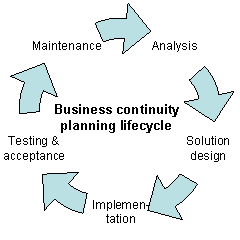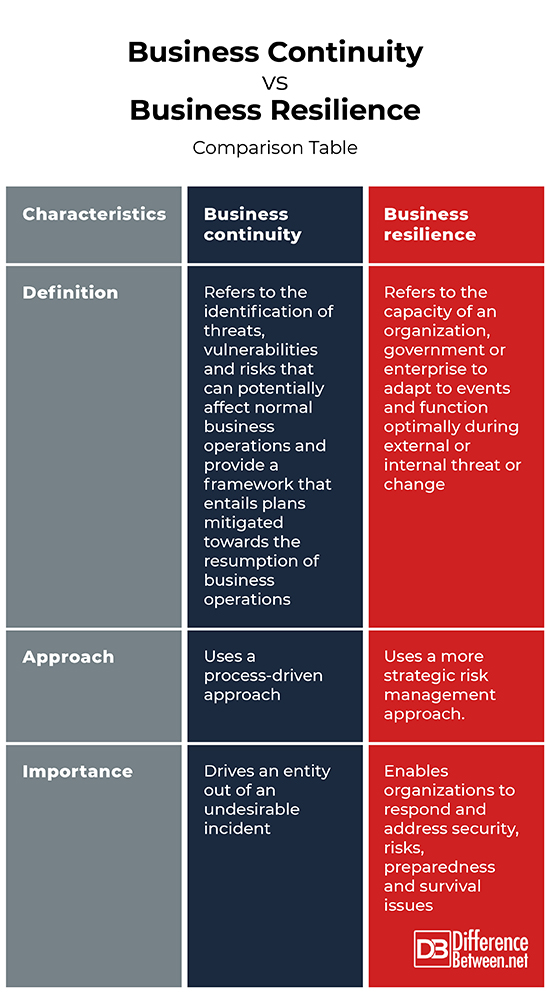Difference Between Business Continuity and Business Resilience
Business operations are often threatened by different disruptions. With the current competitive and fast-world especially, disruptions can occur with zero warnings. While some could be due to human error and ignorance, others are natural disasters such as floods, earthquakes and natural fires. While some businesses survive through these tough periods, others do not survive, and end closing up. The difference between the businesses that resume operations after these disruptions is the level of preparedness which entails a business continuity plan as well as the business’ resilience.

What is Business Continuity?
This is the identification of threats, vulnerabilities and risks that can potentially affect normal business operations and provide a framework that entails plans mitigated towards the resumption of business operations, even with the occurrence of these unfortunate events.
A business continuity plan aims at driving an entity out of an undesirable incident. It is hence process-driven and can be standardized.
Building a business continuity plan entails;
- Carrying out a business impact analysis- This defines the most essential data needed for business operations
- Performing a risk assessment- This entails the identification of potential points of failure.
- Managing risks- This involves the mitigation of identified risks

What is Business Resilience?
This is the capacity of an organization, government or enterprise to adapt to events and function optimally amid external or internal threat or change. With resilience, businesses can respond and address security, risks, preparedness and survival issues.
Business resilience responds to all types of risks and encompasses business continuity and crisis management. It also entails an organizations’ ability to adapt to a new environment and integrates different disciplines into a single set of integrated processes. It is a more strategic risk management approach. Since different organizations have individual needs, it is tailored to each entity.
Among the risks businesses are likely to come across in this day and age include;
- Civil strikes and emergencies
- Pandemics
- Disruptive technological advances
- Supply chain failure
- Economic disruptions
- Natural disasters
- Terrorism
- Cyber terrorism and crime
- Compliance failures
The essentials for a business resilience strategy include;
- A business continuity plan- This responds to unforeseen operational disruptions
- A disaster recovery plan- This enables the recovery of an organization from real disasters
- A value protection plan- This ensures the protection of shareholders
- An exploitation plan- This enables organizations to spot and exploit commercial opportunities that may be available during the times of disruption
Similarities between Business Continuity and Business Resilience
- Both entail business survival even in unprecedented events
Differences between Business Continuity and Business Resilience
Definition
Business continuity refers to the identification of threats, vulnerabilities and risks that can potentially affect normal business operations and provide a framework that entails plans mitigated towards the resumption of business operations. On the other hand, business resilience refers to the capacity of an organization, government or enterprise to adapt to events and function optimally during external or internal threat or change.
Approach
While business continuity uses a process-driven approach, business resilience uses a more strategic risk management approach.
Importance
Business continuity drives an entity out of an undesirable incident. On the other hand, business resilience enables organizations to respond and address security, risks, preparedness and survival issues.
Business Continuity vs. Business Resilience: Comparison Table

Summary of Business Continuity vs. Business Resilience
While the overlap between business continuity and business resilience, the two terms can be confusing. Business continuity refers to the identification of threats, vulnerabilities and risks that can potentially affect normal business operations and provide a framework that entails plans mitigated towards the resumption of business operations. It uses a process-driven approach and drives an entity out of an undesirable incident.
On the other hand, business resilience refers to the capacity of an organization, government or enterprise to adapt to events and function optimally during external or internal threat or change. It uses a more strategic risk management approach and enables organizations to respond and address security, risks, preparedness and survival issues.
- Difference Between Profit Center and Investment Center - July 2, 2022
- Difference Between Anti-Trust and Anti-Competition - June 6, 2022
- Difference Between Stocktaking and Stock Control - June 6, 2022
Search DifferenceBetween.net :
Leave a Response
References :
[0]Watters Jamie & Watters Janet. Disaster Recovery, Crisis Response, and Business Continuity: A Management Desk Reference. Apress Publishers, 2014. https://books.google.co.ke/books?id=d58QAwAAQBAJ&printsec=frontcover&dq=Difference+between+Business+Continuity+and+Business+Resilience&hl=en&sa=X&ved=0ahUKEwjrs5nc9vfpAhUaQUEAHTtFDX8Q6AEIcTAI#v=onepage&q=Difference%20between%20Business%20Continuity%20and%20Business%20Resilience&f=false
[1]Watters Jamie & Watters Janet. Disaster Recovery, Crisis Response, and Business Continuity: A Management Desk Reference. Apress Publishers, 2014. https://books.google.co.ke/books?id=d58QAwAAQBAJ&printsec=frontcover&dq=Difference+between+Business+Continuity+and+Business+Resilience&hl=en&sa=X&ved=0ahUKEwjrs5nc9vfpAhUaQUEAHTtFDX8Q6AEIcTAI#v=onepage&q=Difference%20between%20Business%20Continuity%20and%20Business%20Resilience&f=false
[2]Geary Sikich. Integrated Business Continuity: Maintaining Resilience in Uncertain Times. PennWell Books, 2003. https://books.google.co.ke/books?id=FlOd8aVC0kwC&printsec=frontcover&dq=Difference+between+Business+Continuity+and+Business+Resilience&hl=en&sa=X&ved=0ahUKEwjrs5nc9vfpAhUaQUEAHTtFDX8Q6AEIVDAF#v=onepage&q=Difference%20between%20Business%20Continuity%20and%20Business%20Resilience&f=false
[3]White D & Caralli R. CERT Resilience Management Model (CERT-RMM): A Maturity Model for Managing Operational Resilience. Addison-Wesley Professional Publishers, 2010. https://books.google.co.ke/books?id=2xvR3g9XZW8C&pg=PA111&dq=Difference+between+Business+Continuity+and+Business+Resilience&hl=en&sa=X&ved=0ahUKEwjrs5nc9vfpAhUaQUEAHTtFDX8Q6AEIZjAH#v=onepage&q=Difference%20between%20Business%20Continuity%20and%20Business%20Resilience&f=false
[4]Image credit: https://en.wikipedia.org/wiki/File:BCPLifecycle.gif
[5]Image credit: https://www.publicdomainpictures.net/pictures/290000/velka/business-planning.jpg
